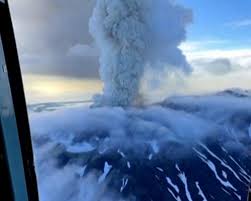
Introduction
The recent eruption of the Shiveluch volcano in Russia has garnered significant attention, not just due to its spectacular displays of nature’s power but also because of its serious implications for local communities and the environment. Monitoring volcanic activity is crucial in understanding geological processes and preparing for potential hazards, making this event particularly relevant to both local residents and the scientific community.
Details of the Eruption
The Shiveluch volcano, located in the Kamchatka Peninsula, erupted on October 21, 2023, sending ash clouds soaring up to 15 kilometres into the atmosphere. This eruption, classified as a significant explosive event, followed a series of smaller eruptions earlier in the month. Volcanologists have confirmed that the volcano is one of the most active in Russia, with its last major eruption occurring in 2000.
The Russian authorities issued hazardous weather warnings as ash fallout reached nearby villages, leading to road closures and disruptions in air travel. The ash plume was observed drifting east, affecting air traffic in parts of the North Pacific. Residents in surrounding areas were advised to stay indoors and use masks to mitigate the effects of ash inhalation.
Impact on Local Communities
The recent eruption has resulted in a temporary evacuation of villages located in the immediate vicinity of the volcano. Local emergency services are on high alert, providing support to those impacted by the ash fallout. Although no fatalities have been reported, the disruption to daily life and potential harm to health systems pose significant challenges. Schools in affected regions have been closed, and the local government is taking measures to ensure the safety of residents.
Scientific and Environmental Significance
This eruption is of particular interest to volcanologists and environmental scientists. Studying such eruptions can provide insights into volcanic behaviour and warning systems that may save lives in future events. The ash can also have notable effects on the environment, from altering soil pH to affecting water quality in nearby rivers and lakes.
Conclusion
The eruption of the Shiveluch volcano in Russia exemplifies the power of natural events and their far-reaching impacts on human life and the environment. As scientists continue to monitor volcanic activity, it remains crucial for local authorities to maintain preparedness plans for such eventualities. The recent eruption serves as a reminder of the unpredictable nature of our planet, urging both communities and their leaders to stay vigilant and informed.
You may also like

An Introduction to Crime 101: Exploring Its Basics and Impact

Japan Issues Tsunami Warnings Following Recent Earthquakes

Russian Activity in Pokrovsk, Ukraine: Current Developments
SEARCH
LAST NEWS
- Remembering Wendy Richard: The Promise to Co-Star Natalie Cassidy
- How Did Anglian Water Achieve an ‘Essentials’ Rating for Mental Health Accessibility?
- Shai Hope Leads West Indies in T20 World Cup Clash Against South Africa
- What We Know About Weston McKennie: Future at Juventus and Past at Leeds
- What We Know About the Upcoming Live Nation Antitrust Trial